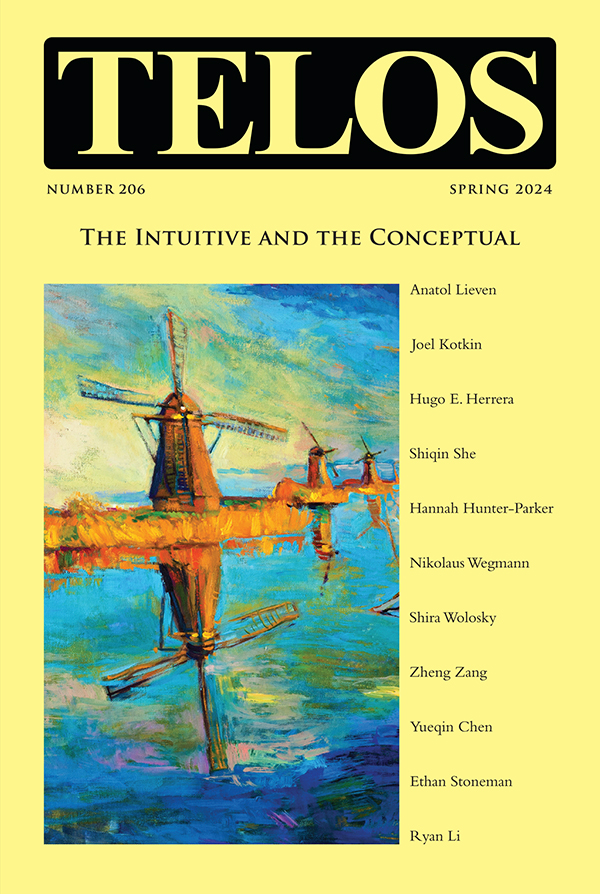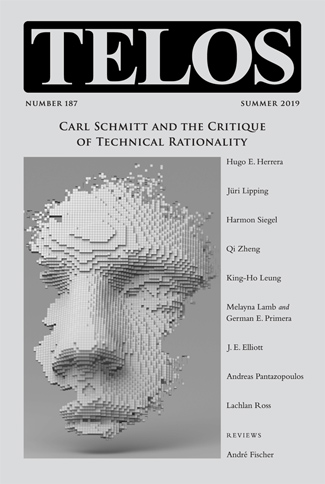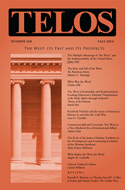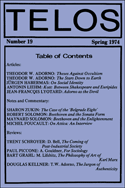By David Pan · Friday, April 5, 2024 Telos 206 (Spring 2024): The Intuitive and the Conceptual is now available for purchase in our store. Individual subscriptions to Telos are also available in both print and online formats.
 We often have the experience of intuiting something without being able to precisely define what that intuition is. Sometimes this intuition leads to a more well-defined insight, and sometimes it might lead to some kind of action, even in the absence of clear conceptual definitions. Yet it is difficult to ascertain what kind of knowledge or awareness such intuitions consist of. What is an intuition as opposed to a defined concept of something? How seriously should we take such intuitions? Are they something separate and qualitatively different than concepts? Are they just fuzzy concepts? Do they really exist at all? These are crucial questions because they lead to conclusions about the status of concepts themselves. If the alternative to clear concepts is nothing at all, then the sociopolitical corollary would be that the alternative to conceptual knowledge and the holders of such knowledge would also be nothing at all. By contrast, if intuitions are separate from concepts and real, then expert knowledge might possibly have some deficiencies in comparison with intuitions. The essays in this issue of Telos explore in one way or another this question of the status of conceptual knowledge as opposed to intuitive awareness. We often have the experience of intuiting something without being able to precisely define what that intuition is. Sometimes this intuition leads to a more well-defined insight, and sometimes it might lead to some kind of action, even in the absence of clear conceptual definitions. Yet it is difficult to ascertain what kind of knowledge or awareness such intuitions consist of. What is an intuition as opposed to a defined concept of something? How seriously should we take such intuitions? Are they something separate and qualitatively different than concepts? Are they just fuzzy concepts? Do they really exist at all? These are crucial questions because they lead to conclusions about the status of concepts themselves. If the alternative to clear concepts is nothing at all, then the sociopolitical corollary would be that the alternative to conceptual knowledge and the holders of such knowledge would also be nothing at all. By contrast, if intuitions are separate from concepts and real, then expert knowledge might possibly have some deficiencies in comparison with intuitions. The essays in this issue of Telos explore in one way or another this question of the status of conceptual knowledge as opposed to intuitive awareness.
Continue reading →
By David Pan · Monday, June 17, 2019 Telos 187 (Summer 2019) is now available for purchase in our store. Individual subscriptions to Telos are also available in both print and online formats.
 After a modern era of technological progress that has led humans to believe in their increasing ability to control nature, we are reaching a point at which this power on a small scale has given way to increasing uncertainty and uncontrollability on the large scale. Not only are the specific effects of climate change difficult to predict and control, the only mechanisms available for such control—agreement and cooperation across national and cultural divides—are not the stuff of engineering but of politics. So with every technological advance that promises to bring us more control over our lives, we as a species are facing ever greater risks and uncertainties. The question concerning technology has become the unpredictability and uncontrollability of its development itself. The key difficulty is a problem of a tension between community or national interests and species-wide interests. While there might be an ethical imperative on a species-wide level to exercise self-restraint in pursuing dangerous technologies such as nuclear weapons, gene manipulation, or coal-fired power plants, such self-restraint could very well lead to the decline or even annihilation of the group that exercises it. The path forward will not be revealed by new technological advances, which can easily create more problems than they solve, but through the development of new ethical, political, and affective frameworks by which people understand themselves and their connections to the rest of the world. This issue of Telos, devoted to Carl Schmitt and the critique of technical rationality, investigates the ways in which Schmitt’s critique moved him toward ways of considering law, politics, and human history as fundamentally uncertain movements, requiring strategies that accept such unpredictability even as we try to intervene in our historical development as a species. After a modern era of technological progress that has led humans to believe in their increasing ability to control nature, we are reaching a point at which this power on a small scale has given way to increasing uncertainty and uncontrollability on the large scale. Not only are the specific effects of climate change difficult to predict and control, the only mechanisms available for such control—agreement and cooperation across national and cultural divides—are not the stuff of engineering but of politics. So with every technological advance that promises to bring us more control over our lives, we as a species are facing ever greater risks and uncertainties. The question concerning technology has become the unpredictability and uncontrollability of its development itself. The key difficulty is a problem of a tension between community or national interests and species-wide interests. While there might be an ethical imperative on a species-wide level to exercise self-restraint in pursuing dangerous technologies such as nuclear weapons, gene manipulation, or coal-fired power plants, such self-restraint could very well lead to the decline or even annihilation of the group that exercises it. The path forward will not be revealed by new technological advances, which can easily create more problems than they solve, but through the development of new ethical, political, and affective frameworks by which people understand themselves and their connections to the rest of the world. This issue of Telos, devoted to Carl Schmitt and the critique of technical rationality, investigates the ways in which Schmitt’s critique moved him toward ways of considering law, politics, and human history as fundamentally uncertain movements, requiring strategies that accept such unpredictability even as we try to intervene in our historical development as a species.
Continue reading →
By Mary Frances McKenna · Thursday, October 30, 2014  In this article, I focus on the impact on modern Western thinking, ideas, and engagement with the world of the loss of the assumption of a creator, or an intelligent ordering agent, in conjunction with the emphasis on detail in preference to the whole in modern thought. I begin by discussing some of the critical dynamics contributed by Jerusalem, Athens, and Rome to the concept of Europe in an attempt to identify the source of the energy and vitality arising from this synthesis. I particularly look at the synthesis of Jerusalem and Athens, specifically how each influenced the other and where the potential for synergy arose. This Western synthesis no longer operates in Europe and the West. In this article, I focus on the impact on modern Western thinking, ideas, and engagement with the world of the loss of the assumption of a creator, or an intelligent ordering agent, in conjunction with the emphasis on detail in preference to the whole in modern thought. I begin by discussing some of the critical dynamics contributed by Jerusalem, Athens, and Rome to the concept of Europe in an attempt to identify the source of the energy and vitality arising from this synthesis. I particularly look at the synthesis of Jerusalem and Athens, specifically how each influenced the other and where the potential for synergy arose. This Western synthesis no longer operates in Europe and the West.
Continue reading →
By Yonathan Listik · Tuesday, March 12, 2013
As an occasional feature on TELOSscope, we highlight a past Telos article whose critical insights continue to illuminate our thinking and challenge our assumptions. Today, Yonathan Listik looks at Jürgen Habermas’s “On Social Identity,” from Telos 19 (Spring 1974).
 Jürgen Habermas’s objective in “On Social Identity” is clearly defending the usage of instrumental rationality toward the development of a universal morality. For Habermas, the new social identity should be constructed through universalistic moral systems, thereby eliminating possible frictions or incoherence present in modern society. The obsolescence of the state and its replacement by autonomous means of identity construction, such as art, already point to his emphasis on a more particular form of identity construction. Jürgen Habermas’s objective in “On Social Identity” is clearly defending the usage of instrumental rationality toward the development of a universal morality. For Habermas, the new social identity should be constructed through universalistic moral systems, thereby eliminating possible frictions or incoherence present in modern society. The obsolescence of the state and its replacement by autonomous means of identity construction, such as art, already point to his emphasis on a more particular form of identity construction.
Continue reading →
|
|
 We often have the experience of intuiting something without being able to precisely define what that intuition is. Sometimes this intuition leads to a more well-defined insight, and sometimes it might lead to some kind of action, even in the absence of clear conceptual definitions. Yet it is difficult to ascertain what kind of knowledge or awareness such intuitions consist of. What is an intuition as opposed to a defined concept of something? How seriously should we take such intuitions? Are they something separate and qualitatively different than concepts? Are they just fuzzy concepts? Do they really exist at all? These are crucial questions because they lead to conclusions about the status of concepts themselves. If the alternative to clear concepts is nothing at all, then the sociopolitical corollary would be that the alternative to conceptual knowledge and the holders of such knowledge would also be nothing at all. By contrast, if intuitions are separate from concepts and real, then expert knowledge might possibly have some deficiencies in comparison with intuitions. The essays in this issue of Telos explore in one way or another this question of the status of conceptual knowledge as opposed to intuitive awareness.
We often have the experience of intuiting something without being able to precisely define what that intuition is. Sometimes this intuition leads to a more well-defined insight, and sometimes it might lead to some kind of action, even in the absence of clear conceptual definitions. Yet it is difficult to ascertain what kind of knowledge or awareness such intuitions consist of. What is an intuition as opposed to a defined concept of something? How seriously should we take such intuitions? Are they something separate and qualitatively different than concepts? Are they just fuzzy concepts? Do they really exist at all? These are crucial questions because they lead to conclusions about the status of concepts themselves. If the alternative to clear concepts is nothing at all, then the sociopolitical corollary would be that the alternative to conceptual knowledge and the holders of such knowledge would also be nothing at all. By contrast, if intuitions are separate from concepts and real, then expert knowledge might possibly have some deficiencies in comparison with intuitions. The essays in this issue of Telos explore in one way or another this question of the status of conceptual knowledge as opposed to intuitive awareness. 
 In this article, I focus on the impact on modern Western thinking, ideas, and engagement with the world of the loss of the assumption of a creator, or an intelligent ordering agent, in conjunction with the emphasis on detail in preference to the whole in modern thought. I begin by discussing some of the critical dynamics contributed by Jerusalem, Athens, and Rome to the concept of Europe in an attempt to identify the source of the energy and vitality arising from this synthesis. I particularly look at the synthesis of Jerusalem and Athens, specifically how each influenced the other and where the potential for synergy arose. This Western synthesis no longer operates in Europe and the West.
In this article, I focus on the impact on modern Western thinking, ideas, and engagement with the world of the loss of the assumption of a creator, or an intelligent ordering agent, in conjunction with the emphasis on detail in preference to the whole in modern thought. I begin by discussing some of the critical dynamics contributed by Jerusalem, Athens, and Rome to the concept of Europe in an attempt to identify the source of the energy and vitality arising from this synthesis. I particularly look at the synthesis of Jerusalem and Athens, specifically how each influenced the other and where the potential for synergy arose. This Western synthesis no longer operates in Europe and the West.  Jürgen Habermas’s objective in “On Social Identity” is clearly defending the usage of instrumental rationality toward the development of a universal morality. For Habermas, the new social identity should be constructed through universalistic moral systems, thereby eliminating possible frictions or incoherence present in modern society. The obsolescence of the state and its replacement by autonomous means of identity construction, such as art, already point to his emphasis on a more particular form of identity construction.
Jürgen Habermas’s objective in “On Social Identity” is clearly defending the usage of instrumental rationality toward the development of a universal morality. For Habermas, the new social identity should be constructed through universalistic moral systems, thereby eliminating possible frictions or incoherence present in modern society. The obsolescence of the state and its replacement by autonomous means of identity construction, such as art, already point to his emphasis on a more particular form of identity construction. 






